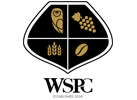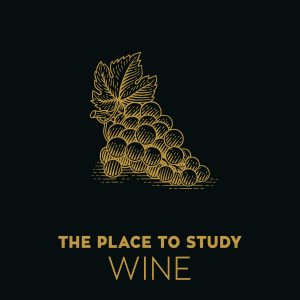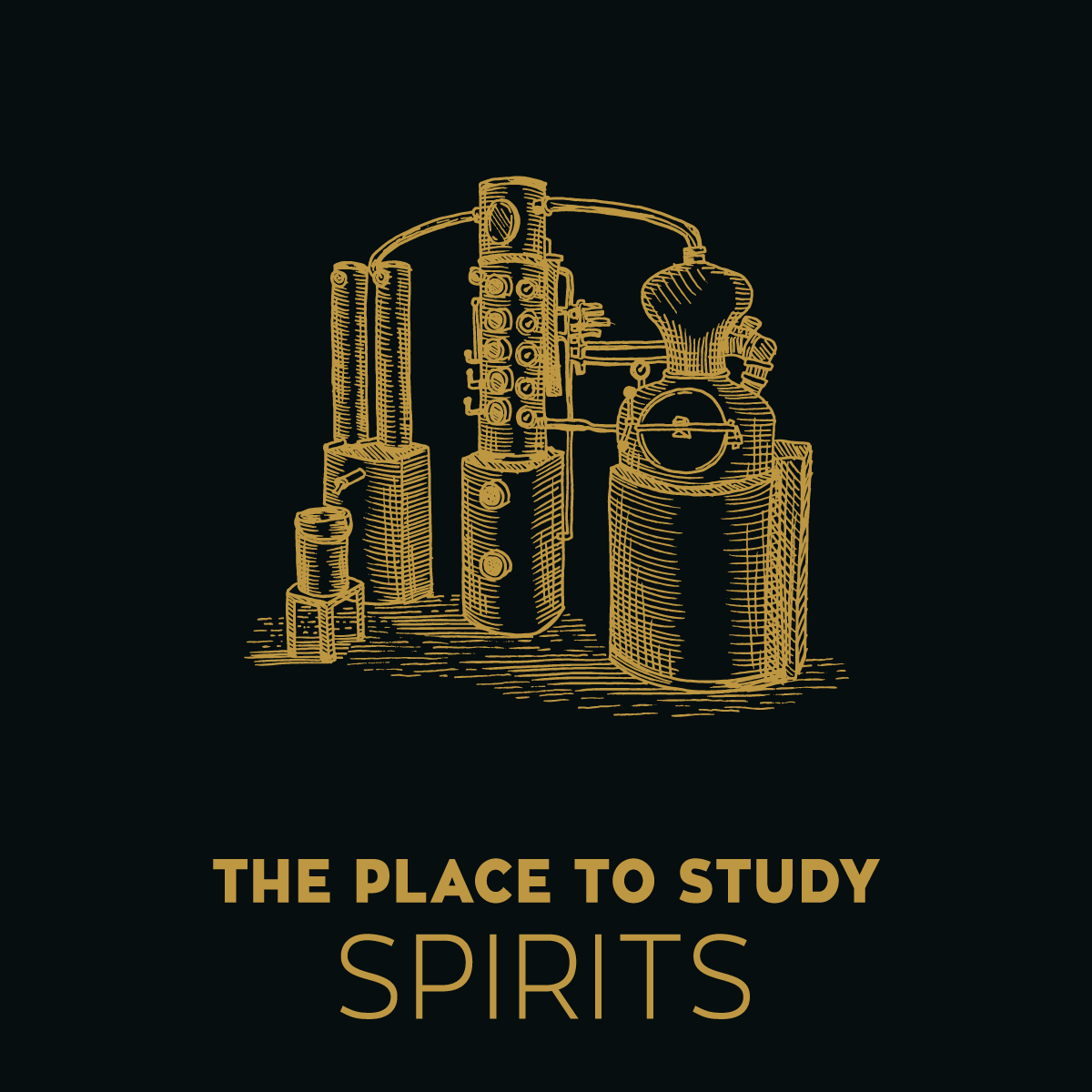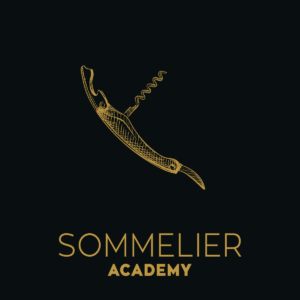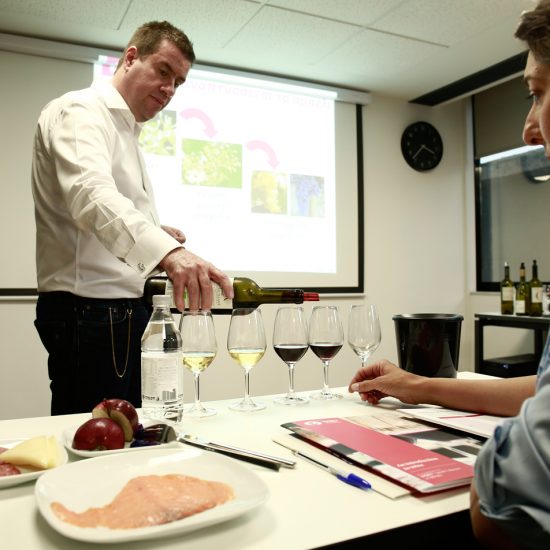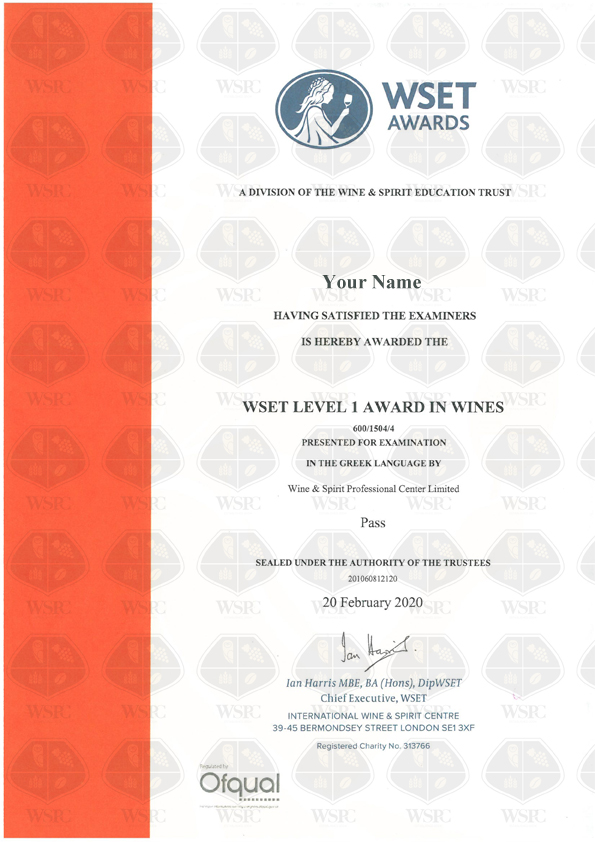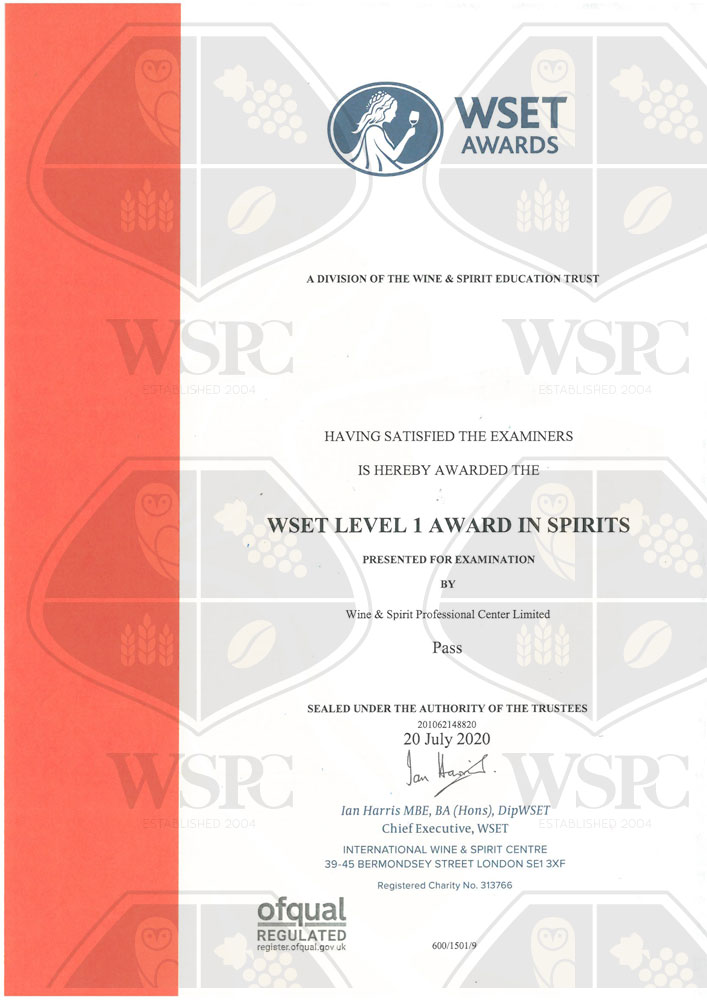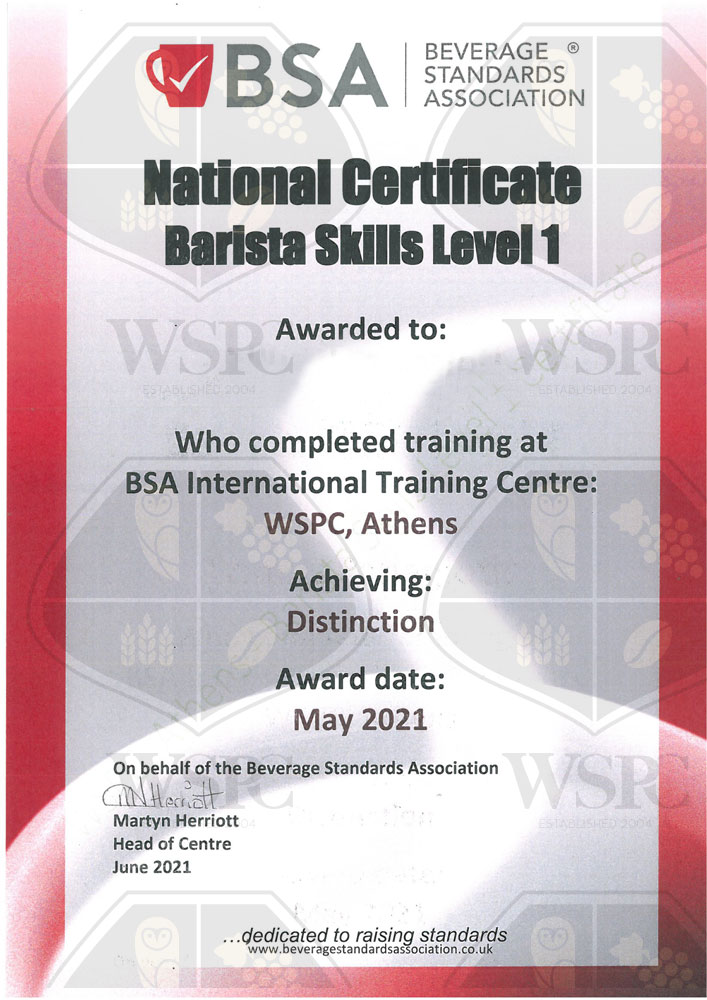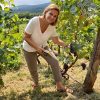HO.RE.CA. COMBO : Wine, Spirits, Coffee-Cocoa-Tea
€932.5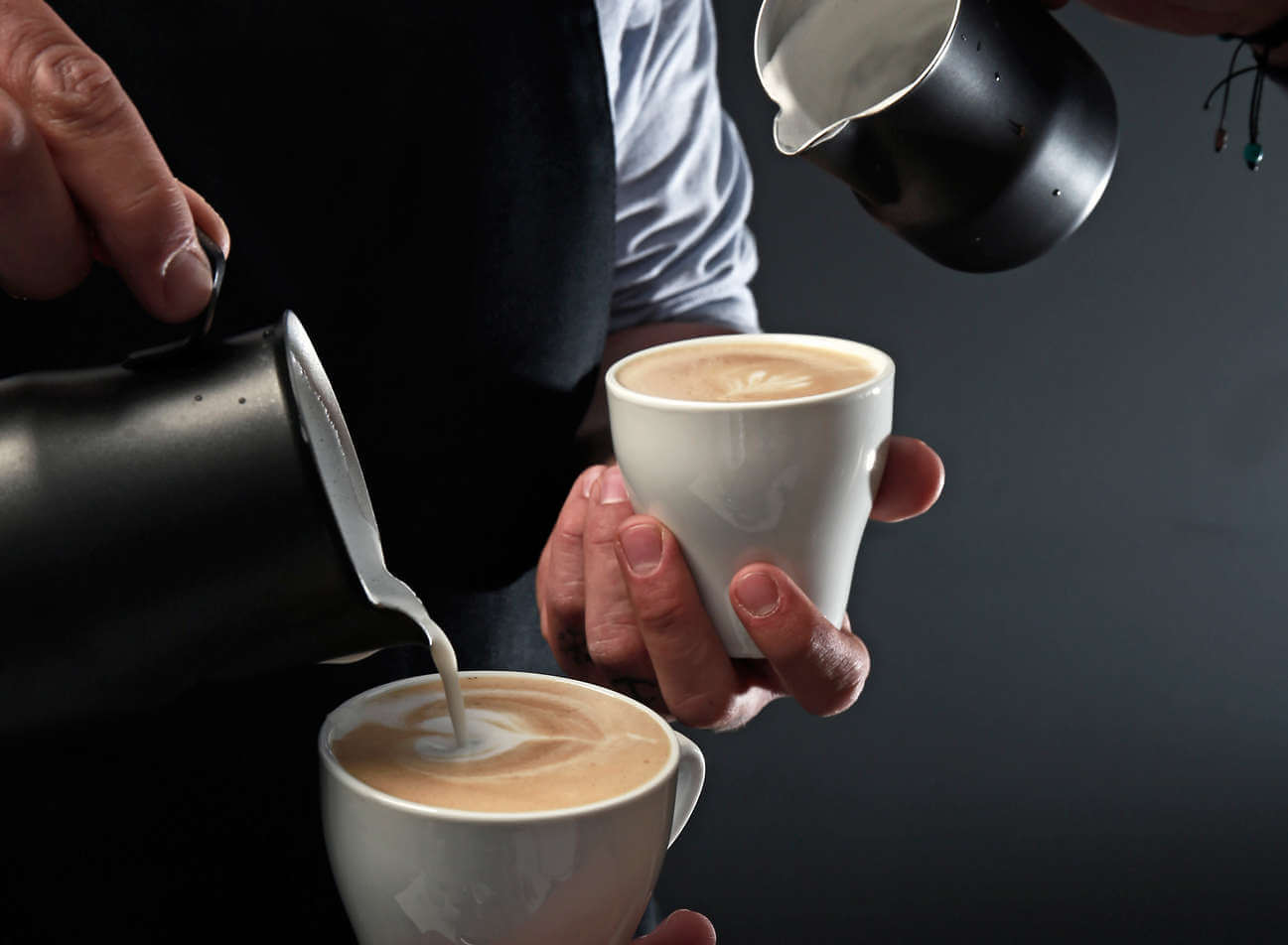
About this course
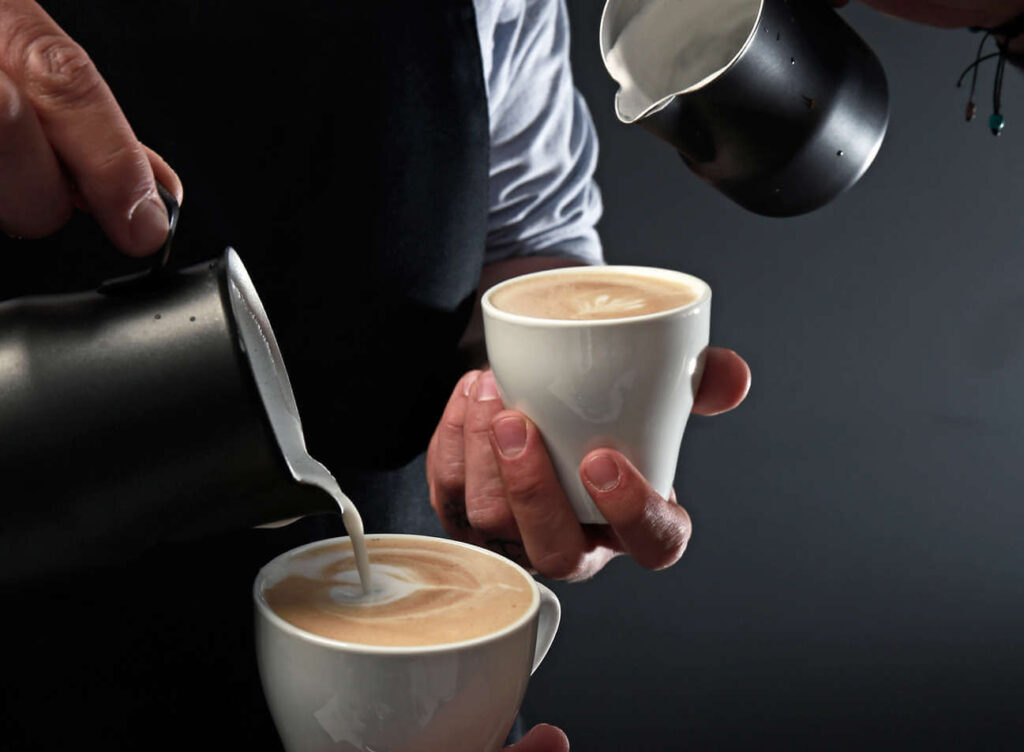
or Installments
The selection of installments reshapes the final value of the fees and the number of installments is applied at the completion of your order, during Checkout.
For professionals in the sector of hospitality, and service, WSPC created an exclusive educational Program covering and combining all 3 basic units: Wines, spirits, and beverage coffee/tea/cocoa/smoothies (WSET L1 WINES, WSET L1 SPIRITS, BSA BARISTA L1 PLUS COFFEE/COCOA/TEA)
WSET Level 1 in Wines focuses on the section of food and wine pairing, through many hours of training and practice which is valuable for the daily life of a professional and an oenophile as well as for rendering a high level of services in all markets addressed to end consumers. The in-depth analysis of food & wine pairing shall be considered as taught-as of this Level for all other Levels of Studies and we shall not revert.
The Level 1 qualification holders shall be in a position to be cognizant of the key stages of grape growing and winemaking, the principal types and styles of wines, the basic characteristics of wines from the main grape varieties as well as other examples of wine and the key principles of wine storage and serving.
The WSET Level 1 Award in Spirits is a substantial basis for knowledge and skills development in spirits and their styles. The students of this Program will learn the production procedure of the principal categories of spirits, their characteristics and the basic principles of tasting, service and cocktails and the correct way for their storage.
The Level 1 Award in Spirits will help anyone who needs to get familiar with the main styles and categories of spirits; for example, it will help Front Line Staff who manage a broad portfolio of alcoholic drinks in retail, wholesale sectors and hospitality. The key principles of tasting governing both spirits and wines help students in further advancing their studies in sake.
This program is taught in Greek. The teaching material and the program’s examinations shall be exclusively carried out in English.
The BSA BARISTA Level 1 PLUS Certification provides a reliable theoretical and practical knowledge of the commercial products of coffee, tea and cocoa. It is addressed to students wishing to join the hospitality industry or to professionals who intend to improve and certify their knowledge, acquire experience in tasting, use, handling and serving the products of coffee, tea and cocoa as well as the functioning of the Coffee menu preparation machines.
It also provides a solid knowledge in the correct use of machines for the preparation of quality beverages. It is a necessary qualification for any candidate aspiring to work as a Barista or/and Beverage experts in hotel units, restaurants, coffee chains or for professionals wishing to enhance their knowledge on raw materials and at the same time be certified and hold a reliable educational qualification from the British state with worldwide recognition. This Certification stands out as particularly useful for professionals intending to work in the broader commercial industry involving the above products; for example, companies of coffee, tea, espresso machines and other related companies of the industry.
MORE
Successful performance in the examinations in all three Programs is a prerequisite for being awarded the Certifications.
Overall, this educational Program comprises 41 hours of classes and examinations.
The results are announced in 7 working weeks since the examination date. Successful performance in the examinations is a prerequisite for taking the studies to the Levels 2: Wine-Spirits-Coffee-Tea-Cocoa.
Program of Courses and Curriculum
for Combo Level 1: Wine-Spirits-Coffee-Tea-Cocoa
To attain the purpose stemming from the Certifications, there are four learning outcomes for Level 1 in Wines, three learning outcomes for Level 1 in Spirits and nine learning outcomes for Level 1 in Coffee-Tea-Cocoa.
Level 1 in Wine
Learning Outcome 1: Know the key stages in grape growing and winemaking.
- Parts of the grape
- Grape growing
- Climate
- Alcoholic Fermentation
- Production of still white, red and rosé wines
Learning Outcome 2: Know the types, characteristics and styles of wines from the principal grape varieties and other examples of wines.
- Basic types and styles of wine
- Key grape varieties
- Examples of wines from the key grape varieties
- Examples of other wines
- Examples of Greek wines
Learning Outcome 3: Know the key principles and practices involved in the storage and service of wine.
- Storage of wines
- Wholesale and Retail
- Description of service temperature
- Serving of wine
- Responsible consumption
Learning Outcome 4: Principal food & wine interactions.
- Food ingredients affecting wine
- Elements in wine influenced by food
- Rules in food and wine pairing
- Evaluation exercises
- Substantiation of interactions
Level 1 in Spirits
Learning Outcomes 1: List and state the purpose of the main production processes and stills commonly used in the production of spirits.
- List and state the purpose of the four key steps used in spirits production.
- Identify the two types of still and state how they are used and what style of spirit they can produce.
- Identify the production processes that affect the flavour, sweetness and colour of a spirit.
| Range 1: Four key steps | |
|---|---|
| Four key steps | 1. Process the raw material |
| 2. Fermentation | |
| 3. Distillation | |
| 4. After distillation | |
| Range 2: Types of still | |
|---|---|
| Pot still | Batch distillation |
| Lower strength spirits = pronounced flavour intensity | |
| Column still | Continuous distillation |
| Lower strength = pronounced flavour intensity | |
| Higher strength spirits = light or neutral flavour intensity | |
| Range 3: Production processes that affect flavour, sweetness and colour | |
|---|---|
| Flavour | Raw material, fermentation, distillation strength, unaged, oak ageing (new and old oak), blending (consistency and complexity), redistillation, maceration, adding natural/artificial flavourings, dilution with pure water |
| Sweetness | Added sugar |
| Colour | Oak, caramel, other natural and artificial colours |
Range 1: Storage
Range 2: Important cocktail ingredients
Range 3: Common equipment and glassware
Range 4: Balanced cocktail
Learning Outcomes 2: Name the principal categories and types of spirit and state their defining characteristics.
- Name the principal categories and types of spirit and state the key flavour characteristics of these spirits.
- State the raw materials used for the principal categories and types of spirit.
- Identify key production processes that can have a defining influence on the characteristics of the principal categories and types of spirit.
- State the meaning of key labelling terms for the principal categories and types of spirit.
| Ranges 1, 2, 3 and 4: Principal categories and types of spirit | |
|---|---|
| BRANDY | |
| Type | Cognac |
| Key labelling terms | VS, VSOP, XO |
| VODKA | |
| WHISKY / WHISKEY | |
| -Scotland | |
| Types | Single Malt Scotch Whisky |
| Blended Scotch Whisky | |
| -USA | |
| Types | Bourbon |
| Tennessee | |
| Rye | |
| -Other Whiskies | |
| CARIBBEAN RUM | |
| Types | White, golden, dark |
| TEQUILA | |
| Raw material | Blue agave |
| FLAVOURED SPIRITS | |
| Types | Spiced rum, flavoured vodka, gin, liqueurs |
Range 1: Storage
Range 2: Important cocktail ingredients
Range 3: Common equipment and glassware
Range 4: Balanced cocktail
Learning Outcomes 3: Know and recognise the common equipment and principles involved in the storage and service of spirits.
- Know the correct procedures for the storage of spirits.
- Name the important ingredients used to make cocktails.
- Identify the common equipment and glassware used in the service of spirits.
- State the four factors to consider when making a balanced cocktail.
Level 1 in Coffee -Cocoa - Tea
Learning Outcome 1: Know the principal varieties of green coffee, the coffee producing countries, the procedures for picking, processing, tasting profiles of varieties, roasting and impact of the above on the end product's tasting profile.
- The coffee tree (Coffea) and the coffee cherry
- Main producing countries & climatic conditions
- Coffea Arabica & Coffea Canephora
- Methods of picking
- Methods of processing (Natural, Wet, Pulped natural)
- Coffee Grading and Roasting
- Blend: a mixture of different varieties for the creation of a specific tasting profile.
- Packing
- Flavour characteristics of coffee based on the above factors
- Tasting drill
Learning Outcome 2: Theoretical knowledge of all different types of coffee beverages: espresso, filter, Greek, instant, as well as their composition and decaffeination procedure.
- What is an espresso
- The importance of grinding in espresso/the grinder
- The espresso machine
- The espresso extraction
- What is a filter coffee/different types
- The filter coffee machine
- Basic theoretical principles of filter extraction
- What is instant coffee
- Different types of instant coffee
- What is a Greek coffee/History and characteristics
- The key theoretical principles in correctly preparing Greek coffee.
Learning Outcome 3: Practically know how to use an espresso machine and the grinders for the preparation of espresso, in accordance with BSA specifications; know how to properly clean the machines.
- Grinder calibration
- Weighing of coffee dose
- Steps to proper extraction
- Extraction in 20-30 seconds
- Espresso assessment
- Machine cleaning
- Grinder cleaning
Learning Outcome 4: Know the composition and handling of milk.
- Theoretical knowledge on milk composition and the details related to steam treatment of milk.
- Practical knowledge of correct steam treatment of milk to produce microfoam in accordance with BSA specifications.
- Knowledge in the preparation of beverages based on espresso and milk: Cappuccino, Café latte, Flatwhite, Εspresso Μacchiato, and others.
Learning Outcome 5: Greek coffee, filter coffee, instant coffee. Correct preservation of coffee.
- Practical knowledge and Greek coffee preparation technique
- Practical knowledge and filter coffee preparation technique
- Practical knowledge and instant coffee preparation technique
- Practical knowledge and cold coffee preparation technique (Espresso freddo & Cappuccino freddo).
- Practical knowledge and technique of correct preservation of coffee.
Learning Outcome 6: Know the principal tea varieties, the raw material and the processing methods.
- The tea plant (Camellia Sinensis)
- Climatic conditions and tea plant varieties
- The stages and the processing methods of the different types of tea.
- White tea
- Green tea
- Oolong
- Black tea
Learning Outcome 7: Know the extraction of the types of tea, based on BSA standards.
- Practical knowledge and proper extraction technique of the above varieties, in line with the BSA specifications.
- Tasting of the above tea varieties to determine the differences in flavour characteristics.
Learning Outcome 8: Know the principal cocoa varieties, the raw material and the processing methods of cocoa beans.
- The cocoa tree
- Producing countries and climatic conditions
- Cocoa tree varieties
- Picking and processing cocoa beans
- Cocoa Press/From cocoa bean to Cocoa Liquor
- The chocolate production process
- Tasting cocoa types
Learning Outcome 9: Know the correct preparation of chocolate beverage based on BSA specifications.
- Practical knowledge of the correct preparation of chocolate beverage based on BSA specifications.
Enrollment
- Express your interest by phone (210 9882540 & 544) or via e-mail(education@wspc.gr)
Your enrollment is finalized with the pre-payment of the tuition fees, either through eshop, or through a bank account deposit/ web-banking.
- After the deposit of tuition fees, a Registration Form is sent to you that you should fill in. Upon correct submission of the Registration Form, your registration is automatically completed.
- Candidate students allowed to participate should be over the age of 18 and holders of Level 2 in Wines certification.
- Candidate students must have an e-mail address to enroll. Any important information regarding your studies is sent by e-mail.
- WSET Level 1 Award in Wines & Level 1 Award in Spirits to students successfully completing the course:
On receiving the certificates from WSET London, WSPC sends the Certifications to successful students by courier together with the label pins. The cost for dispatching the certificates shall be borne by the recipient to make sure that this official document will reach the beneficiary on own responsibility.
- Award of BSA BARISTA Level 1 PLUS Certification to successful performers:
On receiving the certificates from BSA London, WSPC sends the Certification for BSA BARISTA Level 1 PLUS to successful students by courier. The cost for dispatching the certificates shall be borne by the recipient to make sure that this official document will reach the beneficiary on own responsibility.
WSPC shall assume no responsibility in case of negligence in receiving the certificate on behalf of the beneficiary. In case of certificate loss, re-issuing by the WSET® and BSA® Awards costs €50.00
- Enrollment corresponds to the course selected by the student. Fees shall not be refundable and shall not be used for enrollment on a next similar course.
- Upon lapse of the registration deadline, there will be no late registration. In the event of a late registration, students shall be encumbered with an additional charge amounting to €70 + V.A.T.
- WSPC shall reserve the right to cancel a course, if the required minimum number of students is not reached. In such a case, the enrolled students shall be credited the entire deposited amount.
Modes of payment:
By Bank deposit to:
- Alpha Bank IBAN: GR33 0140 1180 1180 0233 0000 482 (WSPC L.T.D).
- Piraeus Bank IBAN: GR73 0171 7270 0067 2711 3141 025 (private higher education school).
- Eurobank IBAN: GR06 0260 0190 0005 4020 1143 015 (private higher education school, Vocational Center).
Justification of deposit: Student’s full name, or corporate trade name, in case of a corporate expenditure.
By Credit/Debit card Visa & MasterCard
Basic principles
The purpose of this information is to help our students understand basic principles of behavior that need to be respected throughout the classes.
A class should provide a friendly and harmonious environment, able to promote a high level of learning progress, ensuring a smooth running of the course and respect towards all parties involved in the learning process-both students and instructor.
Don’t miss a class
It has been proven that students who do not miss classes and are assiduous in attending the course, have more chances to perform better in the examination and pass the test with a higher mark. It is students’ personal responsibility to fill in the gap and look out for notes, exercises, homework or/and flights of wines relevant to the class.
Don’t be late for the class
It is a sign of respect vis-à-vis your fellow students and your instructor. Should it happen due to special circumstances, students should enter the classroom as discreetly and quickly as possible, picking the first available classroom desk.
Come prepared to the class
Preparation constitutes an important part of your effort to better comprehend the teaching material and have fewer questions. Students who submit their papers within the deadlines set, manage to maintain a better flow in their studies and to better assimilate the material, significantly raising the chances of successful performance at the exams and with a higher mark. Any assigned tasks submitted overdue shall be dismissed. However, students may correct themselves at home, having as a guide the recommended form of answering applying in every task.
Switch off your mobile phone at the beginning of the class
It is a sign of respect vis-à-vis your fellow students and your instructor. The use of mobile phones in the classroom is highly annoying and distracts students’ attention. If you are expecting an urgent call, you are kindly requested to inform your instructor at the beginning of the class and keep your phone on silent mode. Once you see the incoming call, leave the classroom as discreetly as possible.
Be aware that any portable electronic apparatus (mobile phone, laptop, MP3 player etc) shall not be allowed during the class. For your reference, you may take a photo of the bottles used in wine tasting during the break or at the end of the class (the bottles remain in a visible spot).
Don’t talk to each other during the class
It is a sign of respect vis-à-vis your fellow students and your instructor. The noise provoked from chatting is likely to distract the instructor and other fellow students, thus disrupting the smooth flow of the class.
Don’t monopolize the floor by raising too many questions preventing your fellow students from submitting their queries
Questions facilitate a broad understanding of the lesson. The time allocated for questions is up to the instructor’s discretion (either during or at the end of the lesson). However, students should take into account the available time for questions, reducing the number of questions addressed to the instructor and enabling their fellow students to raise their own questions.
THE ABOVE PRINCIPLES APPLY ALSO DURING THE EXAMINATIONS
Important Information on the examinations
The examination for the WSET Level 1 Certification is a closed-book assessment comprised of:
- Practical 45-minute assessment of food-wine pairing.
This exercise is assessed directly by the WSPC Internal Assessor and is qualitative, not quantitative. - 30 multiple-choice questions to be completed in 45 minutes.
Successful performance at this unit requires a total minimum mark of 70%. Candidates should answer correctly at least 21 questions. - The language of examination will be Greek. In case you wish to sit the examination in the English language, you should declare it when requested.
The examination for the WSET Level 1 in Spirits Certification is a closed-book assessment comprised of:
- 30 multiple-choice questions to be completed in 45 minutes.
Successful performance at this unit requires a minimum mark of 70%. Candidates should answer correctly at least 21 questions. - The language of examination will be English.
The examination for the BSA BARISTA Level 1 PLUS Certification is a closed-book assessment comprised of:
- A theoretical examination consisting of 15 questions of short written answers that should be answered within 60 minutes. All examination questions are based on the learning outcomes. The main study material and the supplementary manual constitute the Program’s curriculum.
Successful performance at this unit requires a minimum mark of 60 per cent. - The practical examination in which the candidate is assessed by the Accredited/Trainer/BSA Examiner in the preparation of products may last up to 60 minutes. Across all stages and objects of examination, the candidate should prove adherence to the steps and specifications of the organization during the preparation of products.
- The language of examination will be Greek.
A minimum total grade (Written & Practical Assessment) of 66% is required for successful performance in the Educational Program and the awarding of the BSA BARISTA Level 1 PLUS Certification.
| Mark of 92% and above | Pass with Distinction |
| Mark of between 82% and 91% | Pass with Merit |
| Mark of between 66% and 81% | Pass |
| Mark of 65% and below | Fail |
WSET® Awards does not award Qualifications/Certificates unless all prerequisites and assessment requirements regarding the studies and the examinations for each Program of studies are fulfilled (aegrotat pass).
Persons with Disabilities
Candidates with special examination and assessment requirements, are requested to inform the Enrollments officer and/or the Examinations officer on any such requirement prior to enrollment on a Program. It is the policy of WSET Awards that such candidates should not be placed at a disadvantaged position during the courses or at the examinations. Where appropriate, WSPC and WSET may request from the student to submit an official medical opinion by a qualified state body related to the candidate in question.
Re-sit
Candidates may apply to resit the examination if they failed the examinations. There is no limit on the number of attempts to resit the examinations. Candidates who have passed the examinations are not allowed to resit to improve their grade.
- Examinations are compulsory. If a candidate does not sit the examination on the fixed date and time, it will be possible, to request and sit the next possible examination:
-For Level 1 in Wines qualification on a re-sit cost (non-show re-sit exam): €49,00.
-For Level 1 in Spirits qualification on a re-sit cost (non-show re-sit exam): €49,00.
-For Level 1 in Coffee-Tea-Cocoa qualification on a re-sit cost (non-show re-sit exam): €49,00. - If a candidate fails at the examination on the fixed date and time, it will be possible, to request and sit the next possible examination:
-For Level 1 in Wines qualification on a re-sit cost (re-sit exam): €95.00
-For Level 1 in Spirits qualification on a re-sit cost (re-sit exam): €70.00.
-For Level 1 in Coffee-Tea-Cocoa qualification on a re-sit cost (re-sit exam): €95.00. - Enrolment to Levels 2 requires successful performance at Levels 1.
Requirements, regulations and examination conditions
1. To participate in the examinations, candidates must adhere to the following specific conditions:
- At the start of the examination, all candidates must submit to the invigilator a statutory identification document with a photograph (identity card or a driving license or a passport).
- Candidates should bring their own: Hb2-type pencils, erasers, pencil sharpener.
- Candidates must bring their own bottle of water.
- The examination should be completed within the time foreseen.
- No note or explanation is to be made on any material, in whatever form, other than the examination multiple-question paper and answer sheet.
- Any communication between candidates of any kind shall not be permitted.
- The use of electronic devices of any kind (mobile phones, smart phones, smart watches, tablets etc) shall be prohibited.
- Candidates shall be forbidden to take photographs of the examination room or the examination material.
- The use of any kind of dictionaries is forbidden.
- The use of audible alarms from any kind of watch is prohibited.
- It is at the invigilator’s discretion to allow entry to late arriving candidates and only if this does not disturb the examination process.
- Candidates are not allowed to leave the room before the first 15 minutes of the examination time have elapsed.
- Candidates who complete the examination prior to its official ending, may leave the room on condition that they do not disturb the other candidates. After leaving the room, re-entry shall not be allowed.
- The invigilators have no authority to comment, interpret or express an opinion on any examination question or/and on any conceptual question raised by candidates.
- Any candidate suspected of inappropriate behavior, shall be called upon to leave the examination room immediately and his/her examination paper shall be submitted to the Examinations Committee which shall determine its validity and any future prohibition to participating in the examinations.
- The sheet with the examination questions shall not be removed from the examination room. Candidates who fail to submit the questions sheet along with their answer sheet, shall be considered to have breached the rules.
- It is forbidden to reveal the examination content to others or anyhow reproduce it.
2. Candidates must also comply with the invigilator’s instructions. Failure to do so may result in the examination results becoming invalid.
3. The examination papers submitted for assessment belong to BSA® Awards and shall not be returned to candidates.
WSET Level 1 Award in Wines & Level 1 Award in Spirits to students successfully completing the course:
On receiving the certificates from WSET London, WSPC sends the Certifications to successful students by courier together with the label pins. The cost for dispatching the certificates shall be borne by the recipient to make sure that this official document will reach the beneficiary on own responsibility.
Απονομή Πιστοποίησης BSA BARISTA Level 1 PLUS στους επιτυχόντες:
Το WSPC, αμέσως μετά την παραλαβή των πτυχίων από το BSA Λονδίνου, αποστέλλει στους επιτυχόντες με courier την Πιστοποίηση για το BSA BARISTA Level 1 PLUS. The cost for dispatching the certificates shall be borne by the recipient to make sure that this official document will reach the beneficiary on own responsibility.
WSPC shall assume no responsibility in case of negligence in receiving the certificate on behalf of the beneficiary. In case of certificate loss, re-issuing by the WSET® and BSA® Awards costs €50.00.
Where do classes take place?
At our state-of-the-art facilities in Paleo Faliro. In a building of 1,250 sq.m surface including the specially designated Coffee-Cocoa-Tea Lab (CCT Lab), in line with the most rigorous health and safety specifications. Click here for a virtual tour around the school.
Are there any conditions in place for my enrolment on classes in person and therefore for entering the school?
WSPC is subject to an educational and health protocol. Therefore, the registration in all in person educational programs is for students who meet the requirements, as defined by the bodies responsible for ensuring Public Health.
What do I gain choosing a COMBO class?
Reduced tuition fees. In case of simultaneous enrolment in more than one Program, an additional discount rate shall be applied.
Time. You complete at a predetermined, shorter period two or more Qualifications of Studies.
May I enrol directly in this Program?
We recommend carefully reading the ‘Specifications’ for all the Qualifications you will be attending. They will help you better understand the requirements for the Programs you attend, better plan your time and achieve the optimum result at the examinations.
Read them here:
WSET Level 1 in Wines | WSET Level 1 in Spirits | BSA Level 1 in Coffee-Tea-Cocoa
Is there a V.A.T rate applied on the tuition fees?
No, because WSPC is an educational organization certified by the Ministry of Education.
What do tuition fees include?
Everything. The fees cover the Greek edition of the books for Level in Wines and Level in Coffee-Tea-Cocoa, the English version of the book for Level 1 in Spirits, the enrolment respectively on WSET and BSA London, the examination cost, the exam papers and the issuing of the Qualification from WSET London and BSA London respectively, the teaching hours by a certified tutor, the tasting wines bought (free samples are not accepted), as well as any logistics cost incurred to carry out the unit ‘Food & Wine Pairing’ we choose to instruct thoroughly and in depth, just like all other courses.
May I be absent from the class?
Attending the courses and sitting the examinations is compulsory.
What happens if I do not show up at the examinations?
You may enrol to participate in the next scheduled examination of the Program, either in the same city or in another city where exams will be held, paying the resit amount:
-For the Level 1 in Wines (non-show re-sit exam): €49.00.
-For the Level 1 in Spirits (non-show re-sit exam): €49.00.
-For the Level 1 in Coffee-Tea-Cocoa (non-show re-sit exam): €49.00.
What happens if I fail the examinations?
You may enrol to participate in the next scheduled examination of the Program, either in the same city or in another city where exams will be held, paying the resit amount:
-For the Level 1 in Wines (re-sit exam): €95.00.
-For the Level 1 in Spirits (re-sit exam): €70.00.
-For the Level 1 in Coffee-Tea-Cocoa (re-sit exam): €95.00.
How long does it take for the results to be announced?
It takes seven (7) working weeks since the examination date.
How do I get informed about the results?
By e – mail from the WSPC Admissions & Awards team.
What does it mean to succeed in Combo Levels 1 examinations?
You become holder of the 3 first internationally renowned Certifications awarded by the WSET (Wine & Spirit Education Trust), and the BSA (Beverage Standards Association) headquartered in the United Kingdom (London) respectively:
- WSET Level 1 Award in Wines – and you may enrol to the next level of studies, WSET Level 2 in Wines
- WSET Level 1 Award in Spirits – and you may enrol to the next level of studies, WSET Level 2 in Spirits
- BSA BARISTA Level 1 PLUS – and you may enrol to the next level of studies, BSA BARISTA Level 2 PLUS
How do I receive my Certifications?
On receiving the certificates from WSET & BSA, we send you the Certifications by courier together with the label pins-where applicable. The cost for dispatching the certificates shall be borne by the recipient to make sure that this official document will reach you, as the beneficiary on own responsibility.
May I pay the fees in instalments?
Yes. Through the eshop, you may pay in installments with your credit card.
Is there a possibility for corporate enrolments?
Yes, it is possible. Contact us to fill you in.
What are the foreseen options in case classes in person are discontinued due to force majeur, as was the case with the pandemic COVID-19?
The lessons of Wine and Spirits will continue normally through online platform.
The courses on Coffee-Cocoa-Tea will continue in the way and in the time to be indicated by the Ministry of Education & Religious Affairs.
